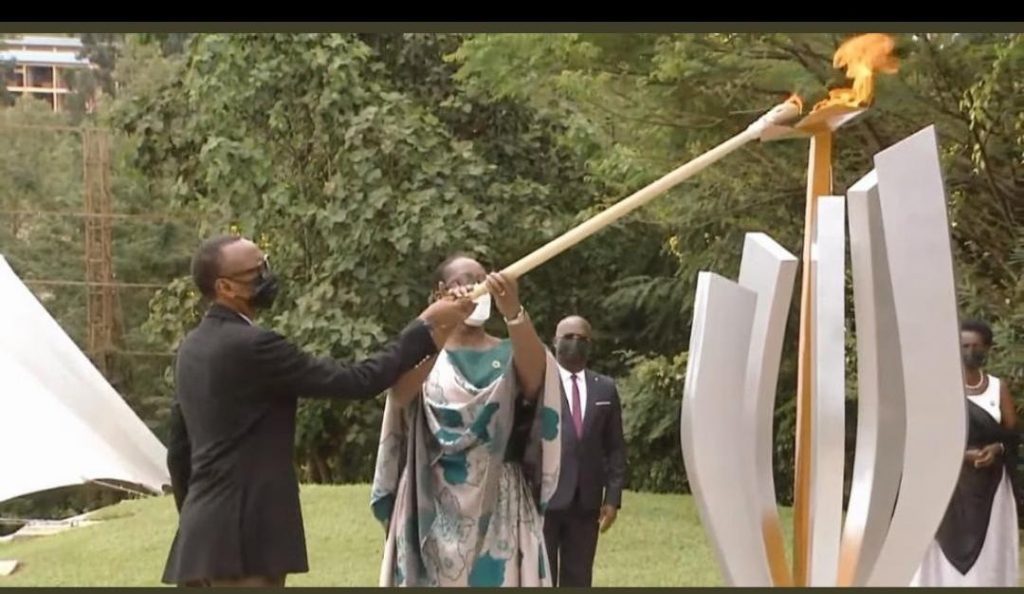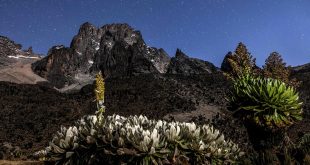
Rwanda President Kagame said during the ceremony to mark the 27th commemoration of the 1994 genocide against the Tutsi said that “Despite a unanimous resolution by the United Nations (UN) general assembly, there are still two countries which stubbornly refuse to use the phrase ‘Genocide against the Tutsi’, just as they resisted using the word ‘genocide’ in 1994 until it was too late.”
Kagame further revealed that there are five suspects who have been living in one country whose case files are ready and Rwanda has been asking for their repatriation to no success giving all sorts of excuses. Although Kagame he did not name the countries, Rwandan netizens identified the countries as United States and United Kingdom. According to the Unit in charge of tracking the genocide fugitives in Rwanda, there are 1,100 Genocide fugitives around the world under indictment but host countries are reluctant to cooperate and bring them to justice. Most are in western countries which are fond of accusing Kagame’s government of human rights abuses.
The genocide commemoration ceremony that is held annually on April 7th, was attended by over 500 people including foreign diplomats. The event took place at Kigali Genocide Memorial, where more than 250,000 were laid to rest, preceded by lighting the Flame of Remembrance. The ceremony marks the beginning of the official week of 100 days of commemoration, a time to remember more than one million lives lost during the genocide.
In His speech that also talked about genocide deniers who wish to re-write history by distorting facts, President Kagame reminded that the cynicism and hypocrisy reflected in such bigoted narratives is breath-taking. “It is something we do not deserve, and will not accept,” Kagame stressed. He further noted that people are free to tell lies about him, but that will neither change him or his country to be what such people want it to be.
The statement is believed to be in reference to genocide deniers, Rwandan fugitives and their international supporters, who want to shift the blame of the genocide on President Kagame and the Rwandese Patriotic Front (RPF). There are also critics who pile up all sorts of governance and human rights abuse allegations on President Kagame, and his response to them was that, “we will be happy to be criticized for doing what we have to do and what we believe we have to do.”
Taking note of what Rwanda has achieved in the last 27years, the president noted that it is almost miraculous whose results are attested to by Rwandans. “Rwanda may not be wealthy and we have vulnerabilities and limitations like any other country but we have also to deal with our problems. Rwandans are resilient and are full of purpose and hope, ” Kagame said.
Referring to the Duclert report on the role of France in the genocide against the Tutsi, the President noted that it shows the desire by leaders in France to move forward with good understanding of what happened. Political analysts on the other hand, criticized the report exonerates France conspiracy in genocide, despite overwhelming evidence against France, for training and arming the genocidal government and Interahamwe militia. Operation Zone Turquoise disguised as a humanitarian operation, analysts also believe that it meant to protect and give safe passage to the forces and politicians who planned and committed genocide against the Tutsi.
President Kagame further noted that there were a few countries that stood out and said no when the genocide was happening. One of them was Nigeria which was represented by Ibrahim Gambari and others were Czech Republic and New Zealand.
The UN Secretary General Antonio Guterres in his message commemorating the International Day of Reflection on the 1994 Genocide Against the Tutsi emphasized that everyone must “take a hard look at today’s world and ensure that we heed the lessons of 27 years ago.”
“Today, around the globe, people are threatened by extremist groups determined on boosting their ranks through social polarization and political and cultural manipulation”, Mr. Guterres warned, adding that while the technology and techniques that extremists use are evolving, the “vile messages and rhetoric remain” the same. “The dehumanization of communities, misinformation and hate speech are stoking the fires of violence.” The UN Secretary General noted.
By Africa China review Reporter
 Africa -China Review Africa -China Cooperation and Transformation
Africa -China Review Africa -China Cooperation and Transformation
